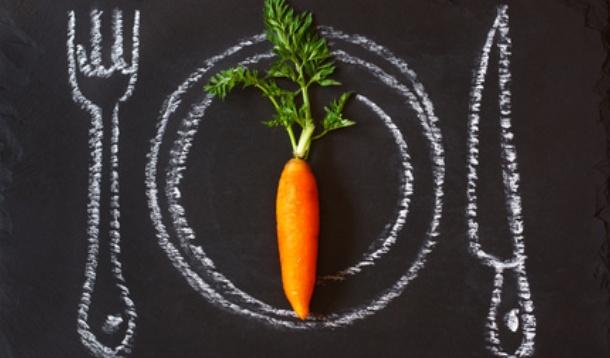
There's healthy eating, and then there's obsessive eating.
When innocent attempts to eat healthfully, such as cutting back on processed foods or eating more fruits and vegetables turns into a pre-occupation, or obsession with eating healthfully 100% of the time, and a mega-restrictive diet regime of only the purest of foods, there is an unhealthy (and scary) shift into the world of disordered eating.
![]() This Is What A 12 Year Battle With Anorexia and Bulimia Looks Like
This Is What A 12 Year Battle With Anorexia and Bulimia Looks Like
Although Orthorexia, which is the term used to describe this obsession with eating healthfully (to the extreme), is not recognized as an Eating Disorder according to the DSM-V (the American Psychiatric Association's Diagnostic And Statistical Manual Of Mental Disorders), it is very much a form of disordered eating, and can - ironically enough - lead to health problems such as nutrient deficiencies, hormonal imbalances, and malnutrition. Those suffering with Orthorexia are not only at risk of physical detriment, but they can also experience severe anxiety and social isolation (often impairing relationships), because they often avoid any social situations where food is involved (like family dinners), in fear that they may be tempted to veer "off track."
Unlike people who suffer with Anorexia Nervosa or Bulimia Nervosa, who are pre-occupied with calories and weight, Orthorexics obsess about the healthfullness, overall quality and "purity" of foods. Orthorexia, which was coined by Steven Bratman, MD in 1997, literally means "fixation on righteous eating." The National Eating Disorder Association explains, "every day is a chance to eat right, be “good,” rise above others in dietary prowess, and self-punish if temptation wins (usually through stricter eating, fasts and exercise). Self-esteem becomes wrapped up in the purity of orthorexics’ diet and they sometimes feel superior to others, especially in regard to food intake."
Because Orthorexia Nervosa cannot be formally diagnosed, it is more difficult to recognize and treat, unlike other well defined psychiatric disorders. Without inclusion in the DSM-V, evaluation of and treatment for Orthorexia is more challenging. Fortunately though, there has been an upswing in research lately in the area of Orthorexia, therefore there is a glimmer of hope that Orthorexia Nervosa will be included in the DSM-V soon (even before the next edition of the DSM comes out).
![]() Extreme Anorexic Woman Gets Fan Letters Asking How They Can Be as Skinny As Her
Extreme Anorexic Woman Gets Fan Letters Asking How They Can Be as Skinny As Her
As a Registered Dietitian who works in private practice, I can say that in the past 5 years or so, I've seen a rise in restrictive thoughts and behaviours around food. It's no wonder - we are all bombarded with messages that we MUST eat gluten-free, "clean", organic and GMO-free foods only, and avoid all chemicals, additives and preservatives at all costs (common examples). And then there is the absurdly popular Paleo Diet, where nutritious whole grains, legumes and dairy foods are demonized and banned from consumption. How can one not feel scared to eat...normally? Oh, and by the way, what is normal eating? I can see how it would be extremely difficult to figure out in our current diet-saturated world.
I often find myself giving my clients permission to eat healthful foods that they've banned from their diets, and am just as often met with looks of disbelief and skepticism. "But, I thought whole grains made you fat?!" and "I stopped drinking milk because it's full of antibiotics and hormones!" are common responses that I get. Because people are bombarded with false and conflicting information about food and nutrition, I find that I'm spending much of my counseling time myth-busting and trying to assure (sometimes convince) my clients that healthy eating doesn't have to be restricting; that less-than-perfect foods can be included now and again without guilt, and that stressing about every morsel eaten is not normal or healthy.
Consider the following questions. The more questions you respond “yes” to, the more likely you are dealing with orthorexia.
*These questions come from The National Eating Disorder Association (United States) website:
If you suspect that you have Orthorexia, or that someone you love is suffering from it (maybe even your child), it's important to seek help from a trained professional. There are Registered Dietitians who specialize in Eating Disorders and Disordered Eating Behaviours, as well as Therapists who are trained to work in this area as well. It's Eating Disorder Awareness Week--we need to start talking.
I post daily nutrition and weight management tips, resources and articles on my Facebook page for both adults and kids. Feel free to check it out!